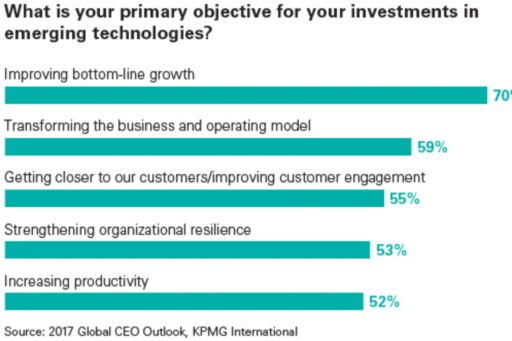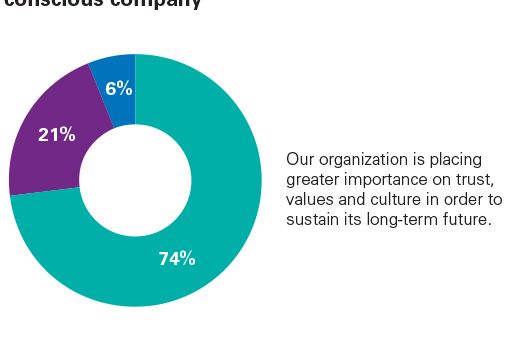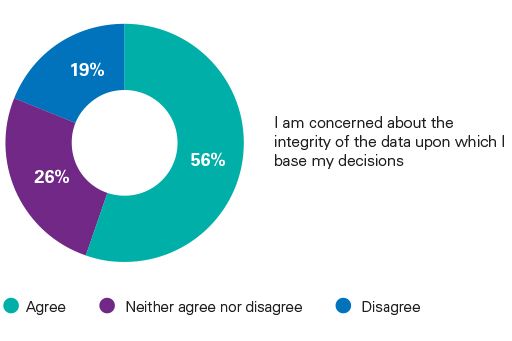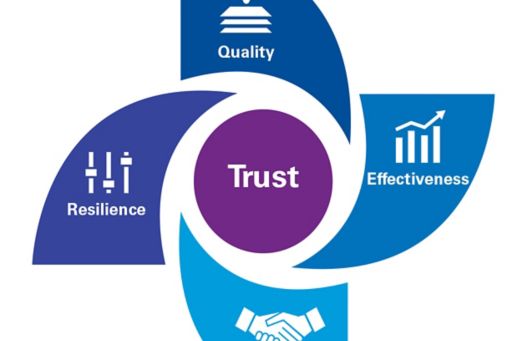Trusted analytics matter to CEOs
Trusted analytics matter to CEOs
Data & Analytics spotlight on Disrupt and Grow: 2017 Global CEO Outlook.
CEOs want to use data to transform their organizations and drive future growth. And they plan to place significant investment into Data & Analytics (D&A) and digital infrastructure to achieve their goals. However, KPMG's recent survey, Disrupt and Grow: 2017 Global CEO Outlook,* of nearly 1,300 CEOs suggests they don't fully trust the data and analytics on which they are basing their decisions. With trust becoming a more important topic on public and corporate agendas, CEOs are increasingly recognizing the value and importance of trusted analytics.
“Trust is an integral component of successful, mutually beneficial relationships between people, societies and global economies. It's instinctive. We rely on trust to approach the uncertain or the unknown with confidence. However, during times of rapid disruption and growing complexity, our instinctive ways of judging trustworthiness can be tested and this has consequences.”
Christian Rast
Head of Global D&A
KPMG International
Opportunity in disruption
CEOs around the world recognize the opportunities that technological advancement and disruption in the marketplace can present to their companies. CEOs say they are taking matters into their own hands and disrupting their own businesses to fuel future growth. And our survey suggests they see D&A as being key to those transformations.
Not surprisingly, many CEOs now expect to put significant investment into emerging technologies in a bid to improve bottom-line growth, transform their businesses and engage customers -- their top three objectives for D&A investments. According to the 2017 Global CEO Outlook:
- 48 percent of CEOs expect major disruption in their sector from technological innovation within the next 3 years
- 38 percent are planning to make significant investments in D&A tools over the next 3 years
- 35 percent will put significant investment into their digital infrastructures
- 70 percent expect these investments to improve bottom-line growth
- 59 percent expect their investments in emerging technologies to help transform the business and operating models.

“Complex analytics underpins most of today's most important business issues, so it's vital that business leaders are able to trust in the data, in the analytics, the algorithms and the decisions that they make on the basis of that data. That's what we mean by trusted analytics.”
John Hall
Partner
KPMG in the UK
Trust helps drive growth
Our survey suggests that trust continues to be a key agenda item for CEOs. Most believe that being a more socially conscious company leads to higher earnings and now see trust as being central to their long-term survival. They also understand that building trust with external stakeholders and customers must be a top priority for their organizations.
We are finding a new, heightened focus on trust is emerging and, as algorithms begin to make more decisions about, or on behalf of, people, are quickly becoming a defining factor of D&A. There is an increasing recognition that the stakes are rising, especially in areas such as cyber security, data privacy, security and public profile. Analytics have increasing financial power and are not guaranteed to be politically or morally neutral. Those who can manage trusted analytics will move forward with confidence, both in their decision-making and their customer relationships.
According to our survey:
- 74 percent of CEOs agree that their organization is placing greater importance on trust, values and culture in order to sustain their long-term future
- 72 percent of CEOs agree that they correlate being a more empathetic organization with higher earnings
- 61 percent of CEOs agree that building greater trust among external stakeholders and customers is among the top three priorities for their organization today.
- 51 percent of CEOs say they are not fully prepared to deal with customer data theft, business data theft or employee data breaches.

“I doubt we will ever get to a point where all decisions can be 100 percent data driven. The instinctive nature, the experiences that top executives have, which you can then layer with the insights you get out of your data, is critically important.”
Mark A. Goodburn
Global Head of Advisory,
KPMG International
However, CEOs don't trust their data
CEOs want to be data-driven. And they recognize the importance of trust. Yet, they do not seem to fully trust the data upon which they are basing their decisions. The majority lack confidence in their ability to secure their data. Most say that the quality of their customer data and management information can't be trusted.
According to our survey:
- 56 percent of CEOs say they are concerned about the integrity of the data they are using for decision-making
- 36 percent of CEOs say they can't make data-driven decisions until they invest significantly in data quality
- 45 percent believe the depth of their customer insight is hindered by a lack of quality customer data.

“If you're relying on software to make the decisions for you, at what point can you trust that those decisions are going to be the right ones? You only build that over time.”
Lisa Heneghan
Global Head of Technology
Management Consulting
KPMG International
Closing the trust gap
At KPMG, we believe that those CEOs able to overcome the D&A trust gap will be better-placed to make faster decisions, more accurately and with much greater confidence. In this environment, CEOs need to take a systematic approach to trust that spans the lifecycle of analytics, one that is founded on four key anchors of trust.
Four anchors of trusted analytics
In a recent report, Building trust in analytics: Breaking the cycle of mistrust in D&A, D&A professionals considered the value of trust in the D&A organization and offered ideas to break the cycle of mistrust:
- Quality: Are the fundamental building blocks of D&A good enough? How well do organizations understand the role of quality in their current approach to organizing, developing and managing data and analytics?
- Effectiveness: Do the analytics work as intended? Can organizations determine the accuracy and utility of the outputs?
- Integrity: Is the D&A being used in an acceptable way? How well aligned is the organization with analytics regulatory compliance and privacy/ethical needs?
- Resilience: Are long-term operations optimized? How good is the organization at ensuring effective governance and security throughout the analytics lifecycle?
Using these anchors, we outline the processes, practices and governance that we implement to deliver trusted data, analytics and models between decision-makers, data scientists and customers.
Trust in D&A should be non-negotiable. Each anchor of trust is relevant at every stage of the D&A lifecycle, from data sourcing to data preparation and blending to analysis and modeling to usage and deployment and, finally, through to measuring effectiveness and back to the beginning of the cycle.

About the survey
The data published in this report is based on a survey of 1,261 chief executive officers (CEOs) from Australia, China, France, Germany, India, Italy, Japan, Spain, the UK and the US. The survey was conducted between 21 February and 11 April 2017. These CEOs operate in 11 key industries: automotive, banking, infrastructure, insurance, investment management, life sciences, manufacturing, retail/consumer markets, technology, energy/utilities and telecom. Three hundred and twelve CEOs came from companies with revenues between US$500 million and US$999 million; 527 from companies with revenues from US$1 billion to US$9.9 billion; and 422 from companies with revenues of US$10 billion or more. In addition, 1,105 CEOs came from public companies and 156 from private companies.
About Global Data & Analytics at KPMG
In a global environment defined by constant disruption, business leaders need D&A they can trust to inform their most important decisions. KPMG's D&A team has earned that trust with an evidence-based, business-first approach that's at our core. For more than 100 years, we have worked across industries to help member firms' clients address their long-term, strategic objectives. And, as an internationally regulated accounting and professional services network, our member firms have an unwavering commitment to precision and quality in everything we do.
* Source: 2017 Global CEO Outlook, KPMG International